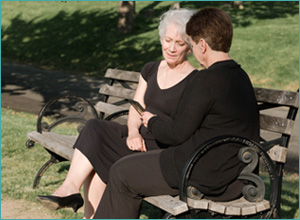Speak up!
If you've written a blog, wish to share a story, or have an idea that you believe would help those visiting the End With Care website, please send it along. If fitting, we'll add your voice to End With Care.
I've got an ideaHelping a Senior After the Loss of a Spouse
Posted on October 5, 2022
 Knowing someone is nearing the end of life doesn’t make it any easier to let go. For seniors, the death of a spouse is often the loss of someone they’ve spent a lifetime with. To be suddenly alone is one of the most traumatic experiences in our lives. Often, there’s relief that a loved one is no longer suffering, but what do you do next? Will this next phase of life be a lonely ones?
Knowing someone is nearing the end of life doesn’t make it any easier to let go. For seniors, the death of a spouse is often the loss of someone they’ve spent a lifetime with. To be suddenly alone is one of the most traumatic experiences in our lives. Often, there’s relief that a loved one is no longer suffering, but what do you do next? Will this next phase of life be a lonely ones?
If you know a senior going through this change, you may be afraid you don’t know them well enough to reach out. But that may be precisely what they need. The following can help you be there for a friend or neighbor who is grieving.
Lend a Hand
Seniors deal with the reality of mortality every day, but that doesn’t make it any easier to manage grief when they lose their partner. It’s normal for a surviving spouse to suffer intense feelings of depression, but be on the lookout for signs of severe depression or isolation. If your grieving friend or neighbor isn’t terribly active, it may be difficult to tell if the sense of isolation has turned into something more serious, so check in on them regularly. It wouldn’t be inappropriate to mention therapy. Older Americans are less likely to go to therapy and may have biases against it, so bringing it up and talking about the good it can do might be doing them a big favor.
Understand that your grieving friend may also be struggling in other ways. If their spouse managed a large aspect of their lives, like finances or their home’s upkeep, the widow or widower may feel overwhelmed by these unknowns. Offer to help them go through their bills and paperwork, and contact the financial institutions to get updated information and to tell them of the recent loss.
You may feel like inquiring about finances or therapy is outside of your role, but politely offering your help is never a bad thing. It’s likely that the bereaved’s extended family will come to town for a week or two before and after the funeral, but there’s often a limit to how long they can stay. Even if your offers are met with rejection or even anger, remember that may be the grief and fear and not the person themselves. Simply offer and see where things go.
Don't Let Them Grieve Alone
After a period of grief, it’s a good idea to check in and make sure that your friend is taking care of themself. It iseasy to become lost in the isolation and numbness of grief. While the feelings of loss never go away, it doesbecome easier to deal with over time. The period of mourning can vary, but it shouldn’t continue indefinitely. If you’re not sure where that line between healthy grieving and severe depression lies, use these questions to get a better sense of your friend’s mental well-being:
- Ask about their family. Are they getting support?
- Have they thought about a bereaved support group?
- Have they been eating right? What kind of meals do they have each day?
- Would they like to adopt a pet or a companion animal?
- Is there somewhere they can volunteer that they’d enjoy?
- Would a low-stress, part-time job be good for them?
Don’t be alarmed if they are resistant to these questions and suggestions at first, but if they continue to avoid engaging with others you may want to seek help from other friends or from their family members. In the meantime, be patient and do what you can, like offering to drive the bereaved to appointments or by picking up some items for them from the store.
When they seem ready, help your friend reconnect with friends. If they were involved in a church or social group, encourage them to attend a service or reach out to a few members for lunch. Or perhaps they would like to reconnect with some friends from the good ole days. In this case, use an online directory to search for old friends from high school. Simply enter their names, graduation years, and the school, and your friend will likely find the names of many familiar people with whom they’re eager to reconnect.
Help Them Remember
 Losing someone with whom you shared a life can leave the widow or widower with mixed emotions. Try not to make assumptions about how they feel or even who their spouse was to them, as not all relationships are happy ones. Let the bereaved talk through their memories and emotions in their own way. There may be things the newly widowed enjoys about being alone, but they may be afraid or reluctant to admit these positives out of guilt or fear of judgment. Do your best to listen without judgment and without interjections. Watch their body language, and just be open to what they have to say. Listen to their version of their spouse to get a sense of that person, and suggest some ways you could honor them together. You could donate to a charity in their honor or set up a scholarship.
Losing someone with whom you shared a life can leave the widow or widower with mixed emotions. Try not to make assumptions about how they feel or even who their spouse was to them, as not all relationships are happy ones. Let the bereaved talk through their memories and emotions in their own way. There may be things the newly widowed enjoys about being alone, but they may be afraid or reluctant to admit these positives out of guilt or fear of judgment. Do your best to listen without judgment and without interjections. Watch their body language, and just be open to what they have to say. Listen to their version of their spouse to get a sense of that person, and suggest some ways you could honor them together. You could donate to a charity in their honor or set up a scholarship.
Help Them Move On
Even if you weren’t close with your grieving friend before, your presence and support has likely brought you much closer. You have helped them through what could well be the most emotionally difficult moment in their life. As they move forward to become the person they will need to be in this new phase of life, you will get to see them flourish and grow. You may also see them struggle, but they will know you are there when they have need. And you may have, in fact, learned a few things from the bereaved along the way. Some of our journeys through life may be difficult, but they are made easier through friendships like the one you have created.
Hal Salazar created Elders.Today to lend a helping hand to seniors via carefully curated resources. Hal is newly retired, and as he embarked on planning and preparing for his golden years, he realized there was a lot of information to keep up with so he started gathering it all on his website to help out his fellow seniors.


